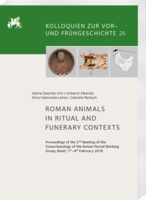|
weitere Titel zum Thema:
Download:
This volume includes a number of papers that were originally presented at the conference Roman Animals in Ritual and Funerary Contexts, which was held in Basel(Switzerland) from 1st–4th February 2018. The conference represented the second meeting of the International Council for Archaeozoology (ICAZ) Working Group on the Zooarchaeology of the Roman Period.
The articles present ritually deposited animal remains across a wide geographical range and incorporate both archaeological and zoological findings. The integration of these two strands of evidence is also one of the central concerns of the ICAZ Working Group, as in the past they have often been dealt with separately. However, it is precisely this interdisciplinary cooperation that opens up new perspectives on ritual practices in a wide variety of contexts. In this volume we see the enhancement of our understanding of ritual treatment of animals in central sanctuaries, in rural areas, at natural sites, and as part of building construction processes. The case studies presented in this volume demonstrate how animal remains such as bones and eggshells provide information beyond diet, economy, and differences in social hierarchy. Their interdisciplinary investigation additionally enables insights into practices governed by cultural, religious, and ideological conditions. |






